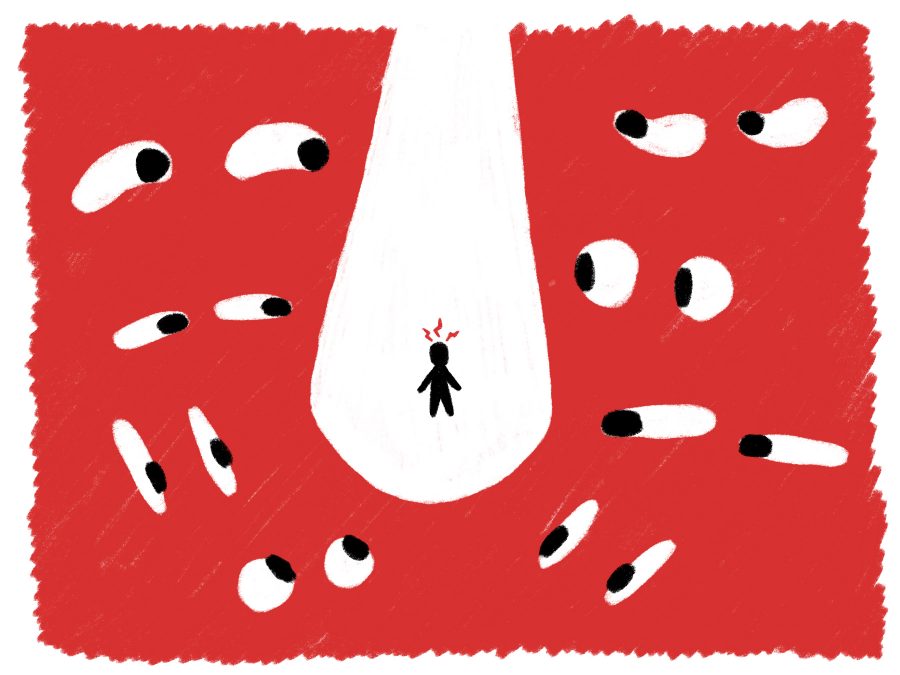Editor’s note: This column was written before the closure of the UT campus due to the Covid-19 pandemic. Its content may or may not reflect the current reality of student life on campus. We believe it is important to share this column to shed light on issues around campus and to honor the work of its author.
Would you rather be a caterpillar in a cocoon or a bee in a beehive? Like many other introverts, I tend to feel more at home in my cocoon. We thrive in uninterrupted stability and cool tranquility. We feel most at home in situations that don’t require large amounts of social output. And although the bees tend to make the most noise, we are content with abstaining from the frenzy in exchange for a more private and reflective role.
What we don’t expect, however, is for our introverted personalities to unfairly hurt us in the classroom.
“I had to drop a class,” linguistics freshman Isabel Helal said. “The professor was very strict. It was a big class, and part of the grade was that you had to raise your hand and ask a helpful question.”
We don’t often think about how our personalities affect the way we learn or that some teaching styles frequently cater toward extroverts while neglecting the needs of introverts. Most students exist on a spectrum, but those with a tendency toward introversion find themselves at a disadvantage when it comes to fulfilling certain classroom expectations.
Catering to a specific type of student and attaching those expectations to a grade infringes on the success of some students, disincentivizing them from engaging in other ways that can be more helpful and productive.
Take participation, for example. Professors often prioritize creating an active and engaging classroom environment by requiring students to raise their hands to ask questions or, like in one of my classes, blurt out a response when we think we know the answer.
We can all think of the student who jumps out of their seat at the opportunity to make their voice heard. Their extroverted tendencies are rewarded with tangible things such as participation points and a higher grade average, and subtle advantages like positive reinforcement from professors that may further instill confidence in them. But professors should also emphasize ways to foster engagement that accommodate students who don’t necessarily thrive under these pressures. They need to provide more opportunities for different types of learners to succeed.
“I think every professor knows that there’s a whole variety of personality types in the classroom,” said Michael Mauk, department chair of neuroscience. “What’s less clear is what it looks like to help or accommodate each of those different types.”
Part of the solution stems from understanding that students have different comfort levels that correspond with their learning needs. Some professors address these differences by using clickers that allow students to respond to questions anonymously, while others facilitate small group discussions in bigger classrooms to help students feel more comfortable.
These well-meaning efforts would be more effective, however, if professors also prioritized student feedback.
“Before I start a lecture, I take a few minutes to ask about what (students) find helpful,” Mauk said. “We get better at what we measure, and if we measure these things, some of us might discover that we’re not doing as well at those things as we thought we were.”
The College of Natural Sciences, for instance, encourages professors to offer midsemester surveys that ask students to provide feedback on topics such as classroom culture and climate. We might be tempted to roll our eyes at these buzzwords, but they address relevant concerns about whether students feel welcomed and motivated in class. Initiatives like this are important in establishing a more open line of communication between students and professors. They can help professors be more aware of whether students are receptive of their teaching styles and whether they feel supported in their efforts to succeed.
I agree with Mauk that “there is something magical about classrooms.” There is something special about being encouraged to be curious and critical about the world. I think the little kid in all of us just wants to feel like it’s OK for both caterpillars and bees alike to engage with learning in the best way we know how.
Sailale is a freshman undeclared PACE major from Dallas.





















